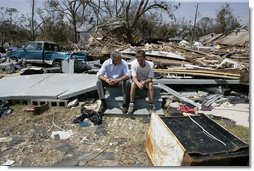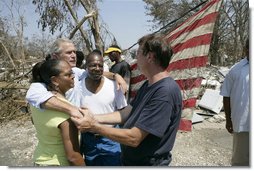
 |
For Immediate Release
Office of the Press Secretary
September 2, 2005
President Tours Biloxi, Mississippi Hurricane Damaged Neighborhoods
Biloxi, Mississippi
|
|||||
12:15 P.M. CDT
THE PRESIDENT: I'm proud to be here with the Mayor of Biloxi. The reason I'm proud to be here with him and the Governor and Senator is because in spite of this terrible tragedy, their spirits are high. It's hard to describe the devastation that we have just walked through. I just talked to a fellow who was raised in a house that used to be, and he's got rubble surrounding him, and I said, "Are you doing all right," and he said, "I'm doing fine, I'm alive, and my mother is alive." I talked to a fellow who runs a wrecking service -- I think it's a wrecking service. He said, "I witnessed Camille. We went through Camille, and we'll go through this storm, Katrina."
 You know, there's a lot of sadness, of course. But there's also a
spirit here in Mississippi that is uplifting. I want to thank the
governor for his strong leadership. He set some clear parameters, and
has followed through on helping calm everybody's nerves. I want to
thank the mayor. Neither of them asked for this when they got elected.
Now they're called upon to help solve the problem.
You know, there's a lot of sadness, of course. But there's also a
spirit here in Mississippi that is uplifting. I want to thank the
governor for his strong leadership. He set some clear parameters, and
has followed through on helping calm everybody's nerves. I want to
thank the mayor. Neither of them asked for this when they got elected.
Now they're called upon to help solve the problem.
And I've come down here, one, to take a look at the damage first hand. And I'm telling you, it's worse than imaginable. And, secondly, to tell the good people of this part of the world that the federal government is going to help. Our first job is to save life. And earlier today, I had a chance to meet with some chopper drivers, guys dangling off of cables that are pulling people out of harm's way. And I want to thank them for their hard work.
We're going to stabilize the situation, and then get food and medicine and water. I traveled today with the head of the Red Cross and the Salvation Army, and people here are going to see compassion pour in here. There's a lot of folks in America that want to help. If you want to help, give cash to the Salvation Army and the Red Cross. We can ask for other help later on, but right now we need to get food and clothes and medicine to the people. And we'll do so. And one of the main delivery systems will be the armies of compassion.
We're going to clean all this mess up. The federal government is going to -- will spend money to clean it up. The first down payment will be signed tonight by me as a result of the good work of the Senate and the House, $10.5 billion. But that's just the beginning. But the people have got to understand that out of this rubble is going to come a new Biloxi, Mississippi. It's hard to envision it right now. When you're standing amidst all that rubble, it's hard to think about a new city. But when you talk to folks that have been through Camille and have seen what happens, and you listen to the spirit of people, you realize, Mr. Mayor, that after a lot of hard work, people are going to be -- people will be proud of the effort. And I want to thank you for your leadership here. And Haley, I want to thank you for yours.
 Again, I want to thank Trent and Thad. They're going to be very
important members of the -- they are important members of the Senate,
and they're going to be an important part of this -- making sure that we
fund this recovery effort.
Again, I want to thank Trent and Thad. They're going to be very
important members of the -- they are important members of the Senate,
and they're going to be an important part of this -- making sure that we
fund this recovery effort.
I'll answer a couple of questions, then I'm going to go.
Q Mr. President, were you prepared for the vastness of the destruction?
THE PRESIDENT: I don't think anybody can be prepared for the vastness of this destruction. You can look at a picture, but until you sit on that doorstep of a house that used to be, or stand by the rubble, you just can't imagine it.
And we took a low -- we took a low chopper ride from here --to here, and we're going to take it on over to New Orleans here. And the destruction is unbelievable. And it's destruction on the coast, and it's destruction off the coast. And we've got a lot of work to do.
Terry.
Q One of the things you hear is people saying a lot of resources are being devoted to Iraq, now this country needs them. And they're frustrated about that. What do you say to the people who say, there's too much money being spent on Iraq and it's time to bring them home?
THE PRESIDENT: I just completely disagree. We've got a job to defend this country and the war on terror, and we've got a job to bring aid and comfort to the people of the Gulf Coast, and we'll do both. We've got plenty of resources to do both.
Somebody questioned me the other day about -- do we have enough National Guard troops? Of course we do. These governors have got compacts with other states. If they need to call upon another state, the state will send Guard troops. And the people have just got to know, we've got what it takes to do more than one thing, and we'll secure our country from the terrorists, and we'll help rebuild this part of the world.
Q This morning, when you said the results are not acceptable, what specifically were you talking about?
THE PRESIDENT: Well, I'm talking about the fact that we don't have enough security in New Orleans yet. Results are acceptable here in Mississippi. You know, the results are acceptable in New Orleans when it comes to the hard work of the Coast Guard. But we need to get troops -- we had 1,200 troops arrive yesterday, I'm told. We're going to have 1,200 today, 1,200 more. These are troops especially trained for military police work. They need to get in there. They need to stabilize that situation. They need to make sure that the food and medicine that is in place is given to the people that need the food and medicine.
 I got a good report today about food and medicine getting to people that
weren't getting it, but we'll find out if it's true when we get to New
Orleans.
I got a good report today about food and medicine getting to people that
weren't getting it, but we'll find out if it's true when we get to New
Orleans.
You know, this is a huge task that we're dealing with. And our jobs, as people in positions of responsibility, is not to be satisfied until the job is done as good as it can possibly be done. And that's what I was referring to. I'm certainly not denigrating the efforts of anybody. But the results can be better in New Orleans. And I intend to work with the folks to make it better.
And again, in Mississippi, we've got a different situation. We've got a Guard that is in place, activated. Haley made some clear rules and is following through on them. But the task, in both places, the tasks are enormous. And it's going to take a while. This is -- our fellow citizens must understand that we're talking years. Now, we're not talking years to get people rescued, we're talking days. And we're not talking years to get infrastructure back up here. We're talking weeks to get the electricity running.
I got some good news on the pipeline, the Colonial Pipeline. We thought it would be at 47 percent, at least I was briefed that yesterday. I'm told it's going to be significantly more than that, which is good news. It means that one of the problem areas that Haley was talking to me about is how -- and the Mayor -- was how do you get fuel to these communities. And obviously, the more fuel going through pipelines, the more fuel will be available not only here in the affected areas, but up and down the Southeast of the country.
And, listen, we're going to have a problem this weekend when it comes to gasoline, just like they've got a problem here. But we're addressing it. We're -- the EPA suspended rules so that we could use -- which attracted -- suspended rules for types of gasoline which attracted fuel from overseas. That's good. We're swapping oil out of the SPRO. We're making sure that there's oil to be processed in the refineries. They're working hard to get these ports open.
Trent was telling me that we got to get that port of Pascagoula open so we can get ships of foreign crude oil to the refinery. And we're -- we just got a lot of work to do. The good news is we know what we're going to do, and we're going to get it done.
Jennifer.
Q Sir, you talk about fixing what's wrong and you talk about the results not being acceptable, but there are a lot of people wondering why you weren't fixing the problems yesterday or the day before, and why the richest country on Earth can't get food and water to those people that need it?
THE PRESIDENT: The levees broke on Tuesday in New Orleans. On Wednesday, we -- and Thursday we started evacuating people. A lot of people have left that city. A lot of people have been pulled out on buses. It's -- I am satisfied with the response. I'm not satisfied with all the results. They started pulling people off roofs immediately. They started rallying -- we started rallying choppers to get people off rooftops, started savings lives. I mean, thousands of peoples' lives have been saved immediately, and that's good news.
This is one of the worst storms in our nation's history. New Orleans got hit by two storms, one the hurricane, and then the flood. And it's going to take a monumental effort to continue moving forward, but we will. And this is a nation that has done a lot of big things before, and this is going to be one of the biggest, which is to recover from one of the worst storms, if not the worst storm. Haley called it the worst, I'm calling it one of the worst storms in the nation's history.
Yes.
Q Mr. President, thank you for coming. We appreciate it very much. There's a need for immediate housing and long-term housing. Many people right now have no shelter, and on top of that, many people do not have flood insurance. They never expected a tidal surge of this magnitude. What can you say about housing efforts?
THE PRESIDENT: Well, I appreciate that. The -- FEMA will be providing a lot of temporary housing. And that's one of the responsibilities that FEMA assumes, to find shelter for people.
And in terms of the longer term, the government has got the capacity to make low-interest loans and help businesses get back going. And there will be a -- again, once the situation gets stabilized, there will be the appropriate authorities here to start passing out the forms necessary for people to apply for the relief and the help they can get. But the federal government will be providing the temporary housing.
Q Mr. President, I realize the first priority is, obviously, saving lives. But let me ask you about long-term planning in New Orleans. There are some who are starting to say that since we're going to be spending billions in tax dollars to rebuild that great city, that we might want to think about building it in such a way where it's not below sea level again, whether it's somehow moved around or relocated or moved up. What are your thoughts on that?
THE PRESIDENT: My thoughts are, we're going to get somebody who knows what they're talking about when it comes to rebuilding cities. I'm going to delegate. I'm going to call upon the best experts, starting with the people of New Orleans, and get opinions as we work with the local folks. We're going to help people rebuild, Stretch. That's what we're going to do. And we're going to listen to people who know what they're doing.
But my objective now, of course, is to save lives and get people out of New Orleans, and then -- and make sure that those who are out of New Orleans and in New Orleans get food and help, just like in Mississippi. Mississippi people have got to understand that I know a lot of the focus is on New Orleans, but I'm thinking about Mississippi, as well. I'm not only thinking about coastal Mississippi, I'm thinking about rural Mississippi, places in this part of the state that are remote and don't have electricity. And they just got to know that the governor talked to me about it, and I listened very carefully about the problems facing these good folks. And one of the things we're going to concentrate on is getting these -- getting these electric plants up and running and getting the power to the people so that they can have the electricity necessary to live a more normal life.
It's -- these are tough times. This is a storm the likes of which, you know, I pray I never see again. It's the like -- it's a storm the likes of which the people who have been through Camille, they said, you know, Camille was terrible; we're never going to see anything like Camille again. Camille was in '69. And a guy said, you know, we felt safe here in this part of the neighborhood because Camille didn't hit it. And sure enough, we witnessed a storm worse than Camille.
And again, I want to thank all the people that are working hard. You -- we've seen line crews, we've seen firefighters from around the country. People around here are going to be amazed at the compassion that pours into this community. First things first, we've got to make them safe.
Mr. Mayor, again, thank you for your hospitality, thank you for your compassion.
MAYOR HOLLOWAY: Thank you, Mr. President.
THE PRESIDENT: Governor, thanks for your leadership.
GOVERNOR BARBOUR: Thanks for your help.
THE PRESIDENT: Thank you all.
END 12:32 P.M. CDT